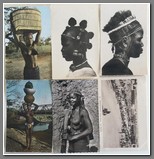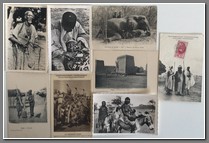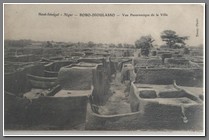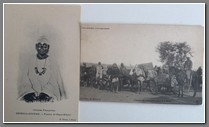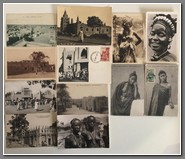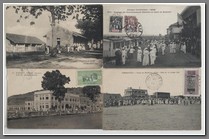French West Africa
31 colonial postcards of types and economic/social activity in Cote d’Ivoire. Shown are types Agni, Coniaguis, Bobo, Krowboy and others; different forms of dance; waiting for the evening meal; woodworking; various markets; a group of captives carrying earth; different villages; rare shot of a local boutique; local warriors protecting the Eysseric Mission and later their reuniob; receiving the Chief of Aboisso; a school in Bondonkou, convoy carrying the Chief of Aboisso disembarking; local dying of cloth; warrior monks; noble females of Bondoukou; spinning cotton; roof installation in Senoufo country; river culture; Ramadan; rare image of two cannibals leaving the court in chains.
Price: $930.00
 FA 311 FA 311 |  FA 311 FA 311 |  FA 311 FA 311 |
24 colonial postcards of scenes of Niger. Shown are missionary activity, the king of Djermas, Niamey, baby washing, local markets and housing, hunting, Hausa and Libyan traders in Zinder, a “crazy” person begging, playing games, fishing, noteable locals, warriors, local cooking, local dentist, local granary, musician, mother feeding baby while on a donkey, more.
Price: $720.00
5 postcards from the short-lived (1904-1921) colony of Haut-Senegal and Niger.
Note: The "colony of Upper Senegal and Niger" was created, from the colony of Senegambia and Niger , by the decree of October 18, 1904, relating to the reorganization of the General Government of French West Africa. When it was created, the “colony of Upper Senegal and Niger” included the former territories of Upper Senegal and Middle Niger; as well as the third military territory, capital: Sorbo-Haoussa (1900-1903), Niamey (1903-1911), then Zinder from January 1,1911. Its capital was Bamako. A decree of March 2, 1907 incorporated into Upper Senegal and Niger the areas of of Fada N'Gourma and Say , both separated from the colony of Dahomey . On January 1, 1912, the military territory of Niger ceased to be part of Upper Senegal and Niger and became an autonomous colony by decree of October 13, 1922. The decree of March 1,1919, created the colony of Upper Volta and divided Upper Senegal and Niger into two separate colonies: Upper Volta , comprising the districts of Gaoua , Bobo-Dioulasso , Dédougou , Ouagadougou , Dori , Say and Fada N'Gourma; and Upper Senegal and Niger.
Price: $150.00
Four postcards of missionary activity in French Soudan and Haute-Volta between 1933-1947.
Price: $100.00
Note: The territory of French Sudan was reestablished in 1902. Though the borders shifted slightly, there was little territorial change until 1933. At that point, the colony of the French Upper Volta (Haute-Volta, modern Burkina Faso) dissolved, and the northern territory was added to French Sudan. In 1947, Upper Volta was reestablished, and the French Sudan borders became those that eventually became the borders of Mali.
22 early 20th century postcards of scenes, types and economic/social activity in Senegal-Soudan.
Price: $660.00
Note: This collection reflects the early link between French Soudan and Senegal. Later on The Mali Federation was a federation in West Africa linking the French colonies of Senegal and French Sudan for two months in 1960. It was founded on 4 April 1959 as a territory with self-rule within the French Community and became independent after negotiations with France on 20 June 1960. Two months later, on 19 August 1960, the Sudanese Republic leaders in the Mali Federation mobilized the army, and Senegal leaders in the federation retaliated by mobilizing the gendarmerie (national police); this resulted in a tense stand-off, and led to the withdrawal from the federation by Senegal the next day. The Sudanese Republic officials resisted this dissolution, cut off diplomatic relations with Senegal, and defiantly changed the name of their country to Mali. For the brief existence of the Mali Federation, the premier was Modibo Keïta, who would later become the first President of Mali, and its government was based in Dakar, the eventual capital of Senegal.




